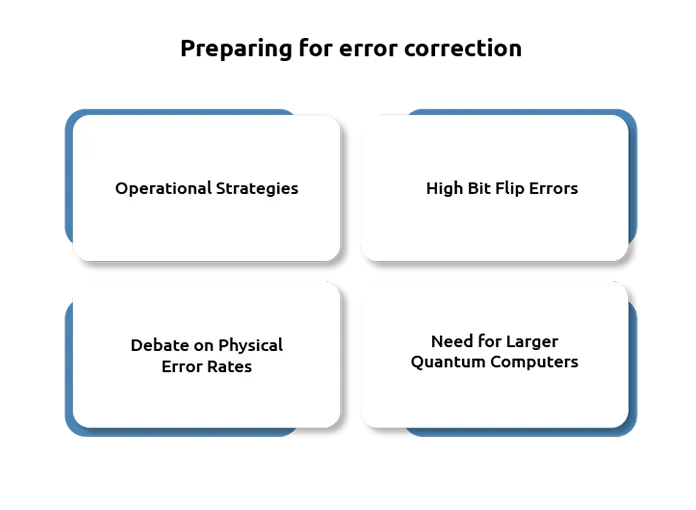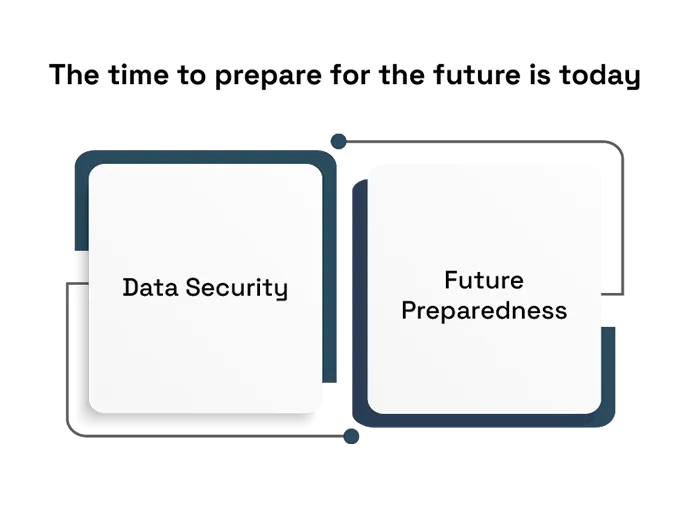The science of using the effects predicted by quantum mechanics has been speculated upon since 1959, and was formalized in 1985, before the first working quantum computer was built in 1998.
The last 40 years have been spent overcoming the vast technical hurdles to creating a working quantum computer. This race for ‘quantum supremacy’ has mostly involved adding ever more qubits over time, from two to more than 1,000.
The significant issue that has arisen is around the security implications of quantum computing, because they are vastly more powerful than conventional computers, and they could break the encryption that underpins all of digital security today. This won’t happen immediately, but there will be a series of steps towards a post-quantum future that will need to be taken before we can see whether quantum computing will be a transformative new technology, a major threat, or both.
With that said, it’s important to explore how the next decades of development are likely to play out. There are no guarantees with technology, but we can see from history and the current technological challenges faced by existing quantum computers what roadblocks may be coming up and how they may be overcome.
Preparing for error correction
The first and most pressing problem for quantum computers that needs to be solved in the near term is error correction.
Currently, around one ‘bit flip error’ in which a zero accidentally becomes a one or vice-versa, occurs in every hundred operations, which makes the current generation of quantum computers practically useless, especially at mathematically-intensive operations like breaking encryption. These errors would have to be reduced to one in a trillion for quantum computers to be as reliable as traditional computers, and as IBM notes, there is debate about whether physical error rates will ever fall below one in ten thousand. If this is the case, then workarounds will need to be found – the simplest being running each operation multiple times and using the most common result, though this would mean having exponentially larger quantum computers.

Another challenge arises because error correction would also mean reducing the external factors that cause noise in the first place. Often, the individual quantum bits that power quantum computers need to be kept at near absolute zero to avoid higher temperatures interfering with the single atoms that make up qubits. These vibrations are the source of errors. Even interactions with outside atoms can disrupt the incredibly sensitive state of the qubits, so quantum computers need to be shielded to avoid fatal errors. There are computers designed for operating in extreme environments like space, which are hardened against interference, and their design might point the way to how future quantum computers will need to be shielded.
In the near term, solving these challenges is going to be the most important technical hurdle for the developers of quantum computers.
Preparing for commercial quantum computing
Once this first challenge is successfully solved, how might quantum computers develop?
A system with a massive number of qubits maintained at near absolute zero with electromagnetic shielding used in space stations isn’t going to be on your desk today, let alone as a handheld device. But this is how the future of quantum computing will proceed – similar to the past of conventional computing. Quantum computers will exist as massive mainframes in mostly government, military, and research roles.
Commercial applications are likely to be accessible through the cloud, like Google’s TPUs, though they are likely to be expensive to use at first and available only to large companies. This will mean that non-state hacking groups are unlikely to be able to access them for years or decades, or at the very least find it difficult to do so. During this time, the only major threats from quantum computing are likely to be from state actors and companies, like defense contractors, who work with them. We have seen in previous conflicts that states will target utility companies or even private companies during conflicts, so it may not be the case that only government and military-adjacent companies need to worry.
However, this doesn’t mean that the confidential data at your company isn’t at risk. For example, if a bad actor were to take a large amount of encrypted data from a company today, they would be very unlikely to be able to decrypt it – breaking RSA-2048 encryption with a conventional computer would take approximately 19.8 quadrillion years. But when they finally have access to reliable quantum computing, breaking that encryption could be trivial.
The time to prepare for the future is today.
This last point underlines why preparation today for a post-quantum future is essential.
We don’t know when commercially viable quantum computers are likely to arrive, but when they do, some of the data that couldn’t be compromised today will be vulnerable. This could be details of bank accounts that are still being used, patent-protected data, sensitive health data, or passwords that are still being used.
If state actors have access to this technology first, then they could falsify older data or create identities with ‘evidence’ stretching back years.
That’s why it’s paramount that companies working with any kind of customer data start looking at what they are storing today and what it could be worth tomorrow.

Conclusion:
Quantum computing has the potential to completely change the way we solve problems, from science to security. But with great power comes serious risks—especially to the encryption and privacy systems we rely on today. While fully functional quantum computers may still be years away, the time to prepare is now. Businesses, governments, and individuals need to understand what quantum computing is, track its progress, and start updating systems and strategies for a post-quantum world. By acting early, we can protect today’s data and be ready to take advantage of tomorrow’s technology.








